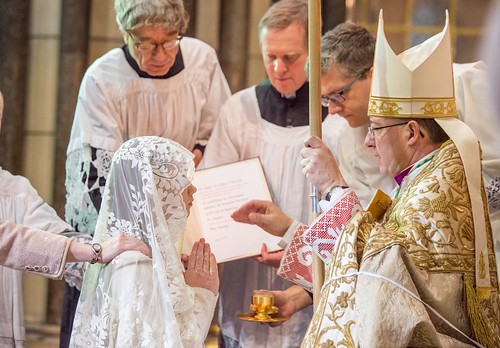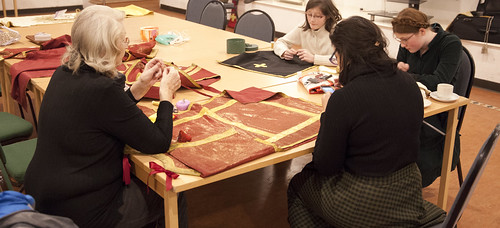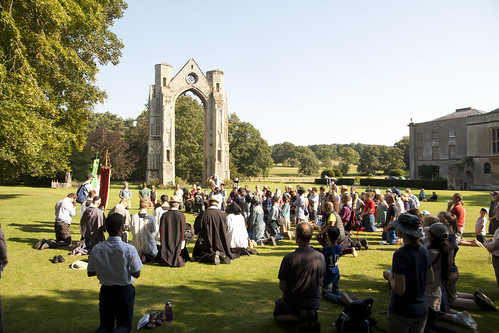Chairman's Blog
Sacramental validity matters
 |
| The Sacrament of Confirmation. It won't be valid if your Baptism isn't valid, and Holy Orders won't be valid if your Confirmation isn't valid. |
The big story of the weekend came from the Archdiocese of Detroit. A certain Matthew Hood watched a video of his own baptism and realized that the officiant, a permanent deacon, had used an invalid formula: he had said ‘We baptize you’, not ‘I baptize you’. This was of special concern since Hood, now an adult, had been under the impression that he had been ordained a priest in 2017.
In some ways, the story is reassuring. It was a letter from the Congregation of the Doctrine of the Faith, under Pope Francis, insisting on the importance of these things, which set this chain of events into motion. The Archdiocese acted swiftly to have Hood properly baptized, confirmed, and ordained, and has done its best to reach other people baptized by the rogue deacon.
Two things remain worrying, however. One is that it is impossible to know how many other people are affected by invalid sacraments. The other is that many Catholic commentators seem not to care.
Take part in the LMS Walking Pilgrimage online this weekend!
Every year since 2010 the Latin Mass Society has had a walking pilgrimage from Ely to Walsingham, which is about 60 miles, for the conversion of England. This year we can't do it because of the Coronavirus: it would have taken place this weekend. Instead we are doing an online version, which you can take part in not only as a participant in live-streamed Masses and devotions, spanning the Shrine of Our Lady of Willesden, Our Lady of the English Margyrs in Cambridge, and the Slipper Chapel in Walsingham, the restored Catholic shrine to Our Lady of Walsingham.
Futhermore, you can join our prayer and penance by actually walking - whereever you are.
How will it work?
After the success of our July Digital Conference we will be bringing Pilgrims a daily schedule of Live-streamed Masses, Meditations, Online Rosary and prayer sessions live streamed on YouTube, Facebook and Zoom as we travel along our virtual route from Willesden in London to Walsingham over the three days. Pilgrims are invited to join in not just online but to get out if they are able and join the walk in their own locations.
Willesden to Walsingham is 118 miles. We need Pilgrims to pledge to walk a distance during the Pilgrimage which can be anything from half a mile to 100 miles! You can do your own pilgrimage in your back garden, in your street or even the local countryside, wherever you are in the world and whatever feels safe and suits you. You can even sign up to the Latin Mass Society Team on the Strava App and log your daily walks. With pilgrims signed up to the virtual pilgrimage walking and praying together we can add up the total of miles walked, along with the number of decades of the rosary said and even the number of songs sung as we pray this August to Our Lady of Walsingham.
How can l sign up?
On the Latin Mass Society website we are asking pilgrims to sign up as an individual or as a group and to pledge how many miles they intend to walk during the Pilgrimage.
See also the LMS YouTube channel:
https://www.youtube.com/watch?v=TlWv-H7tY34
The Facebook event:
https://www.facebook.com/events/3304042452966267/
Walkers can join the LMS Strava Group:
https://www.strava.com/athletes/33948101
Schedule
Friday, 28 August 2020
10:30 Mass from the Shrine of Our Lady of Willesden (courtesy of Fr Stephen Willis, Shrine Rector)
11:00 Introductory talk about the history of Walsingham and the meaning and importance of England being ‘Our Lady’s Dowry
11:15 Meditation from Fr John Cahill on the Meaning of Pilgrimage
11:30 Meditation - Fr James Mawdsley FSSP
11:45 Rosary and Reflection led by Fr Tim Finigan
12:05 Pilgrims' Walk
19:00 Compline
Saturday, 29 August 2020
11:45 Live-streamed Mass from Our Lady of the Assumption & English Martyrs, Cambridge
12:30 Meditations on the Feast of the Beheading of St John the Baptist from the Community of Our Lady of Glastonbury
13:00 Rosary and reflection led by Fr Tim Finigan
13:15 Pilgrims' Walk
19:00 Compline
Sunday, 30 August 2020
14:00 Live Streamed Mass from Walsingham
Bishops' onerous obligation
My latest on LifeSite
Bishops are discouraged by all sorts of things from performing their duties with the fidelity and vigor that the nature of their job enjoins. I don’t envy them. It is often said that many priests decline the offer of episcopal promotion, and it is not difficult to see why. But there is a big difference between saying that doing the right thing is very difficult and saying it is impossible. We can be obliged to do what is very difficult. We can’t be obliged to do the impossible: that is, really impossible.
What should bishops be doing? They have an obligation to safeguard the salvation of all the Catholics in their dioceses, so they must act against spiritual dangers to their flock. Thus, they are under an obligation to denounce ideas or individuals who present an urgent threat to their people’s spiritual welfare, and remove people from roles in the diocese, including schools, where they threaten people’s spiritual welfare.
This kind of thing must be done in an intelligent and strategic way, and there is nothing wrong in itself in a bishop minimizing bad publicity and observing his obligations as an employer and things like that. But it is difficult to avoid the impression that even many bishops who have a reputation for orthodoxy are not doing this intelligently and strategically: they are just not doing it.
LMS Virtual Walsingham Pilgrimage 28-30th August
LMS WALSINGHAM VIRTUAL PILGRIMAGE Friday 28th to Sunday 30th August |
Every year for the last 10 years the Latin Mass Society has held an annual Pilgrimage to Walsingham, walking from Ely in Cambridgeshire to Walsingham in Norfolk over three days during the August Bank Holiday weekend. This year, because of the Covid-19 Pandemic, we have decided to continue this tradition but this year it is to be a virtual pilgrimage from Willesden in north London to Walsingham, and we invite you to get involved. |
How will it work? We invite you to join the walk in your own locations; Willesden to Walsingham is 118 miles. We need pilgrims to pledge to walk a distance during the Pilgrimage, which can be anything from half a mile to 100 miles! You can do your own pilgrimage in your back garden, in your street or even the local countryside, wherever you are in the world and whatever feels safe and suits you. With as many pilgrims as possible signed up to the virtual pilgrimage, and all praying together, we can add up the total of the miles walked, along with rosaries said and songs sung, as we pray this August to Our Lady of Walsingham. The three day event will be streamed live on our Facebook page and Youtube channel. How can l sign up? How do I participate as a walker? We would then like to share your experiences during the Pilgrimage online and amongst our other pilgrims. If you are unable to join in with our walk then we hope you will pray for the pilgrims. |
New webite for the Catholic Medical Association, and their annual Requiem 14th November
It is time to admit that French Catholic Churches are under attack
My latest on LifeSite.
A Rwandan refugee who had been employed as a caretaker has confessed to starting the July fire at Nantes Cathedral, for reasons that remain obscure. The causes of the terrible 2019 fire that severely damaged Notre Dame in Paris may never be known. Fires can start for all kinds of reasons, but there is sadly a pattern of Catholic churches in France being deliberately burned down by people with a hatred for the Church and the Faith. There are, indeed, about 1,000 attacks a year.
The British weekly The Tablet recently reported:
“Something is happening in French society that's long been neglected but is becoming evident with these fires”, said Stefan Lunte, secretary-general of Justice and Peace Europe. “The country is becoming de-Christianized, and there are people who wish, for whatever reason, to vandalize and destroy Christian symbols ... The long-held strategy of keeping this under wraps simply does not work”.
The Justice and Peace movement is not normally associated with wild claims about culture wars, and as an adviser to the Commission of Bishops’ Conferences of the European Community, Lunte must be familiar with the safe and stodgy institutional mainstream of the Catholic Church in Europe. He is clearly fed up with it.
One problem with infallible canonisations
Dr John Lamont made the theological case against the infallible nature of decrees of canonisation on Rorate Caeli a couple of years ago: here's the first post, and here is a follow-up. The other day I stirred up Twitter by repeating some of his arguments and it didn't surprise me at all to see a fair amount of resistence to this idea from traditionally-inclined Catholics.
This follows very naturally from the fact that a lot of old books and old authorities say that canonisations are infallible. What one has to remember is that St Alphonsus and the rest used the term 'infallible' in a far looser way than Vatican I's definition, and when the term is used today it is that definition which tends to uppermost in our minds. Again, the process of determining the sanctity of individuals has been vastly, well, 'speeded up' would be a polite term. Saints generally needed four miracles to be canonised in the past, now they need two. And so on.
But I'm not going into all that again: Dr Lamont lays it all out. No one outside Twitter has ever seriously suggested that the infallibility of canonisations was itself a doctrine of the Church which requires the assent of Catholics. So we can agree to differ, as theologians in fact always have.
I want to point out something else which is of huge importance. The process of canonisation has always required money - the researchers have to be paid - and many of those canonised have well-funded supporters. Having rich chums does not in itself show that a person is not holy - even Christ had some rich friends, after all. But joined to a, ahem, streamlined process, there is a potential problem.
Among those being touted for canonisations there are bound to be celebrity Catholics backed by rich and powerful institutions associated with them which are determined to gain the prestige of having a founder or member canonised, and who fall below the moral standards of sanctity. We have seen how some of these institutions operate. The Legionaires of Christ were able to gain presigious endorsements not for a few years after concerns were raised, but for decades. They paid off some witnesses and denounced others. I think we are fortunate that the monster Macial died after being exposed.
It says something about the capacity of ecclesial institutions to discern who is holy and who is a career criminal that one after another of the founders of successful religious orders and institutions are found, often after their deaths, to have been evil men. The latest is Jean Vanier. A few years ago the suggestion that Vanier was anything other than a saint would have been shouted down by thousands of people genuinely moved and influenced by his work and writings. I don't blame them. Vanier was clever and he was careful. Are we quite sure that no one has been more careful?
At some point one of these individuals is going to be canonised. In fact, I would be very surprised if that hasn't already happened. Who could even read a short account of the life and work of all the people canonised since the system was, er, 'reformed' in 1983? There are thousands of them. But plenty of well-resourced people in the secular media will be happy to make it their business to find some dodgy ones.
One fine day in the next ten years credible allegations will be made against a beatus or canonised saint. Remember, you read it here first. And if we are not careful, the people defending the indefensible will be the conservative and traditional Catholics, the ones who want to defend the whole system and the very concept of heroic virtue and sanctity.
The liberals will just walk away from the shambles. Heck, they don't even believe in supernatural virtue, let alone miracles.
Those Catholics most queasy about the accelerated canonisation process, the ones most leery about canonising every Pope since Vatican II, the ones least comfortable about the scramble to find people to canonise who tick various ethnic and ideological boxes: these are the people who are going to be left to defend the 'St Jean Vanier' or the 'St Marcial Maciel' to be revealed in the future. As the details gradually emerge, as they tend to do, they will be utterly humiliated, and forever associated with the crimes of the accused.
My friends, you are walking into a trap.
Guild of St Clare sponsorship awarded
 |
| A Guild of St Clare Vestment Mending Day before the Coronavirus |
 |
| The Royal School of Needlework at Hampton Court Palace |
Support the Latin Mass Society
Communion on the tongue is an ancient practice
Liturgy should be beautiful
My latest on LifeSite
Liturgy should not be beautiful.
At the Last Supper, Jesus washed stinky feet.
In the Garden, Jesus sweat blood.
At the cross, Jesus was violently murdered.
Upon rising, Jesus still had open wounds.
No, liturgy should not be beautiful. It should be ugly & scandalous.






